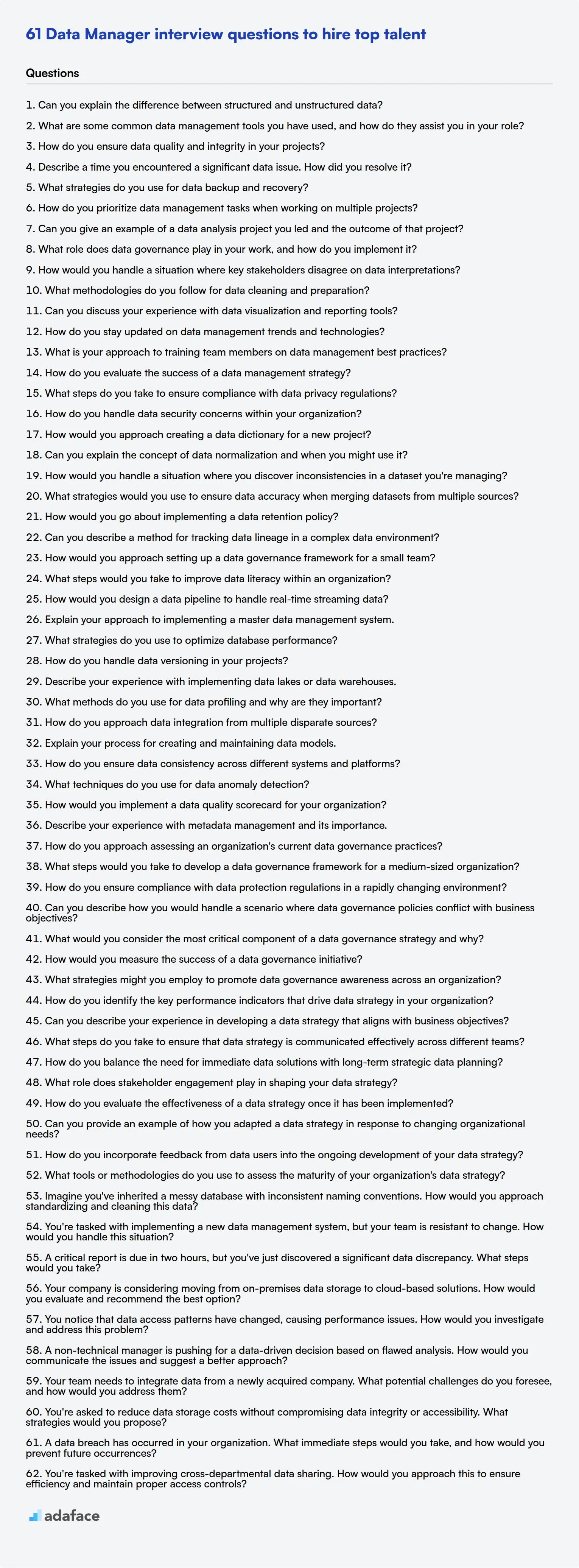Hiring the right Data Manager is crucial for any organization looking to leverage its data assets effectively. Asking the right interview questions can help you identify candidates with the necessary skills and experience to excel in this role.
This blog post provides a comprehensive list of Data Manager interview questions, ranging from basic to advanced, covering various aspects of the role. We've organized the questions into categories to help you assess candidates at different experience levels and evaluate their expertise in specific areas like data governance and strategy.
By using these questions, you can conduct more effective interviews and make informed hiring decisions. Consider complementing your interview process with a pre-employment assessment to get a well-rounded view of candidates' capabilities.
Table of contents
15 basic Data Manager interview questions and answers to assess candidates
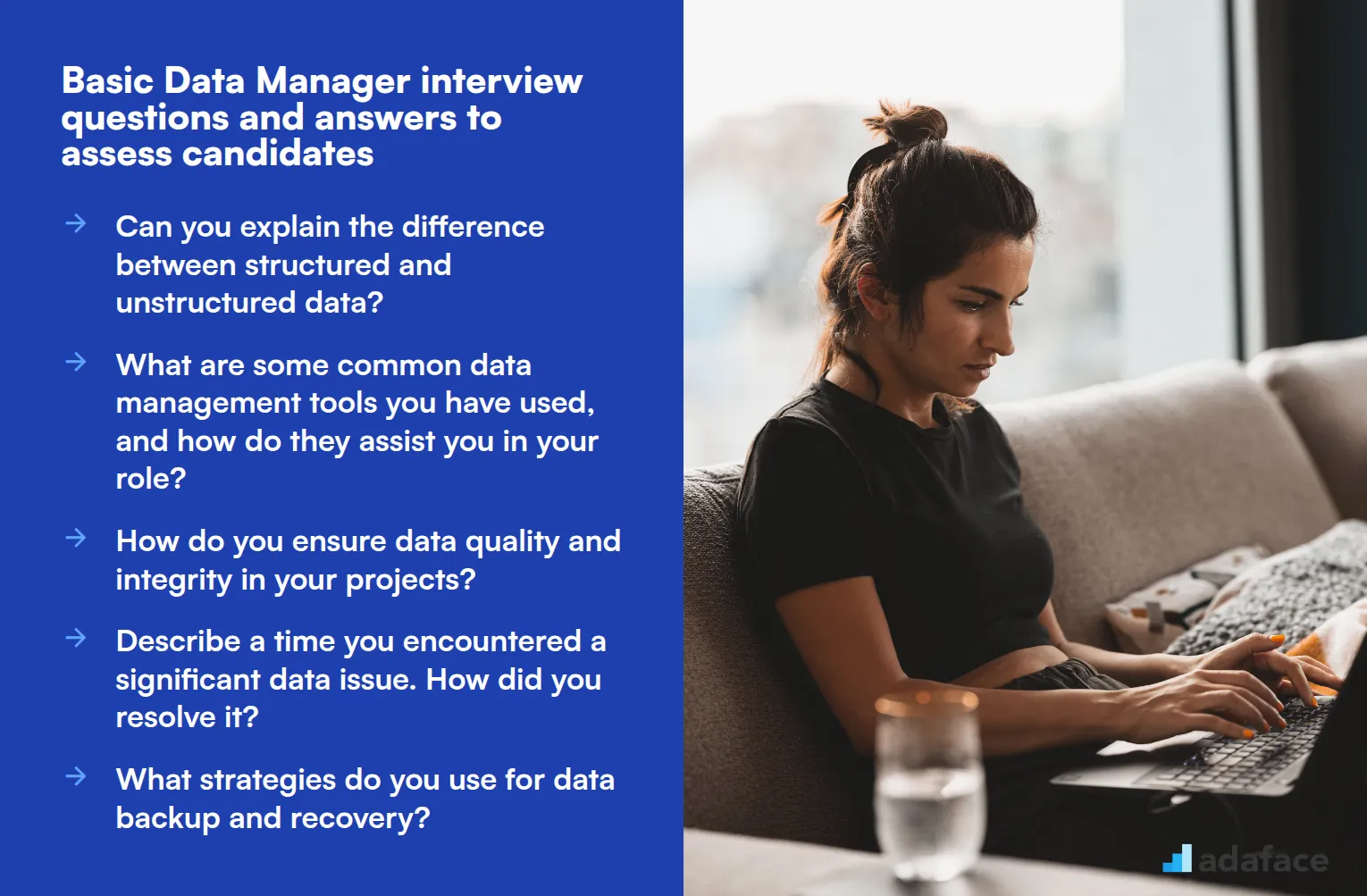
To effectively evaluate candidates for the Data Manager role, consider utilizing this curated list of interview questions. These questions will help you assess their fundamental understanding of data management principles and ensure they possess the skills needed for success. For additional insights on job requirements, check out our data manager job description.
- Can you explain the difference between structured and unstructured data?
- What are some common data management tools you have used, and how do they assist you in your role?
- How do you ensure data quality and integrity in your projects?
- Describe a time you encountered a significant data issue. How did you resolve it?
- What strategies do you use for data backup and recovery?
- How do you prioritize data management tasks when working on multiple projects?
- Can you give an example of a data analysis project you led and the outcome of that project?
- What role does data governance play in your work, and how do you implement it?
- How would you handle a situation where key stakeholders disagree on data interpretations?
- What methodologies do you follow for data cleaning and preparation?
- Can you discuss your experience with data visualization and reporting tools?
- How do you stay updated on data management trends and technologies?
- What is your approach to training team members on data management best practices?
- How do you evaluate the success of a data management strategy?
- What steps do you take to ensure compliance with data privacy regulations?
- How do you handle data security concerns within your organization?
8 Data Manager interview questions and answers to evaluate junior Data Managers
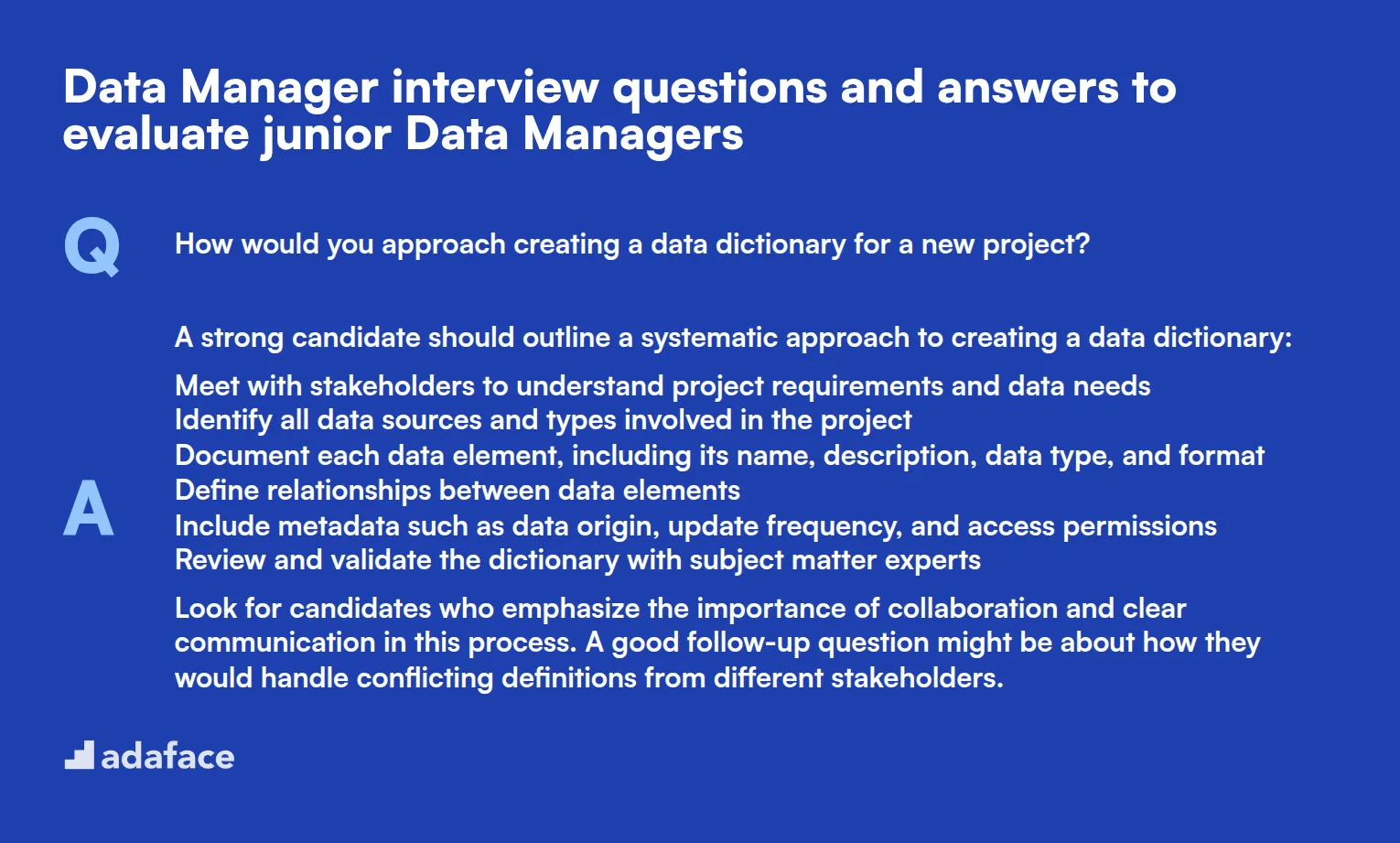
When interviewing junior Data Managers, it's crucial to assess their foundational knowledge and problem-solving skills. These 8 questions will help you evaluate candidates' understanding of data management principles and their ability to handle real-world scenarios. Use them to gauge competency and identify promising talent for your team.
1. How would you approach creating a data dictionary for a new project?
A strong candidate should outline a systematic approach to creating a data dictionary:
- Meet with stakeholders to understand project requirements and data needs
- Identify all data sources and types involved in the project
- Document each data element, including its name, description, data type, and format
- Define relationships between data elements
- Include metadata such as data origin, update frequency, and access permissions
- Review and validate the dictionary with subject matter experts
Look for candidates who emphasize the importance of collaboration and clear communication in this process. A good follow-up question might be about how they would handle conflicting definitions from different stakeholders.
2. Can you explain the concept of data normalization and when you might use it?
Data normalization is the process of organizing data in a database to reduce redundancy and improve data integrity. It involves breaking down large tables into smaller, more manageable ones and establishing relationships between them.
Candidates should mention that normalization is typically used to:
- Eliminate redundant data
- Ensure data dependencies make sense
- Simplify queries and reduce the risk of anomalies during data operations
A strong answer would also touch on the different normal forms (1NF, 2NF, 3NF) and scenarios where denormalization might be preferred for performance reasons. Look for candidates who can balance the theoretical knowledge with practical application in real-world data management scenarios.
3. How would you handle a situation where you discover inconsistencies in a dataset you're managing?
A competent junior Data Manager should outline a structured approach to handling data inconsistencies:
- Document the inconsistencies found, including their nature and extent
- Investigate the root cause of the inconsistencies (e.g., data entry errors, system glitches, or process failures)
- Assess the impact of the inconsistencies on current and past analyses or reports
- Develop a plan to clean and correct the data, ensuring all changes are documented
- Implement measures to prevent similar inconsistencies in the future
- Communicate findings and actions to relevant stakeholders
Look for candidates who emphasize the importance of transparency and documentation throughout this process. A good follow-up question might be about how they would prioritize which inconsistencies to address first if there are resource constraints.
4. What strategies would you use to ensure data accuracy when merging datasets from multiple sources?
Candidates should demonstrate an understanding of the challenges in merging datasets and propose strategies such as:
- Perform thorough data profiling on all source datasets to understand their structure and content
- Establish a common data model or schema for the merged dataset
- Implement data validation rules to catch and flag inconsistencies
- Use data cleansing techniques to standardize formats and values across sources
- Employ data matching and deduplication algorithms to identify and resolve conflicts
- Maintain detailed metadata about the origin and transformations of each data element
A strong answer would also mention the importance of involving domain experts to resolve complex conflicts and the need for a robust QA process. Look for candidates who consider both technical solutions and collaborative approaches in ensuring data accuracy.
5. How would you go about implementing a data retention policy?
Implementing a data retention policy requires a systematic approach. Candidates should outline steps such as:
- Understand legal and regulatory requirements for data retention in your industry
- Collaborate with stakeholders to identify business needs for historical data
- Categorize data based on its type, sensitivity, and importance
- Define retention periods for each category of data
- Establish processes for secure data archiving and deletion
- Implement technical solutions to automate retention and deletion processes
- Create documentation and train staff on the new policy
- Regularly review and update the policy as needs change
Look for candidates who emphasize the balance between compliance, business needs, and data minimization principles. A good follow-up question might be about how they would handle exceptions to the policy or manage data across different systems with varying retention capabilities.
6. Can you describe a method for tracking data lineage in a complex data environment?
Tracking data lineage is crucial for understanding the flow and transformation of data across systems. A strong candidate should propose methods such as:
- Implement metadata management tools to capture and store lineage information
- Use data cataloging software to document data sources, transformations, and destinations
- Employ ETL tools that automatically capture lineage during data movement and transformation
- Develop a standardized tagging system for data elements to track their journey
- Create visual data flow diagrams to represent lineage in a user-friendly manner
- Establish processes for manual documentation of data lineage where automated tools are not feasible
Look for candidates who understand the importance of data lineage for regulatory compliance, troubleshooting, and impact analysis. A good follow-up question might be about how they would handle lineage tracking in a hybrid cloud environment or with legacy systems.
7. How would you approach setting up a data governance framework for a small team?
Setting up a data governance framework for a small team requires a pragmatic approach. Candidates should outline steps such as:
- Define clear objectives for the data governance initiative
- Identify key data assets and their owners within the organization
- Establish basic data quality standards and metrics
- Create simple, enforceable policies for data access and usage
- Implement a system for metadata management
- Set up regular data quality checks and reporting
- Assign roles and responsibilities for data stewardship
- Develop a communication plan to ensure all team members understand and follow the framework
Look for candidates who emphasize the importance of starting small and scaling up as the team grows. A good answer should balance formality with practicality, recognizing the resource constraints of a small team while still addressing critical governance needs.
8. What steps would you take to improve data literacy within an organization?
Improving data literacy is crucial for effective data management and utilization. A strong candidate should propose steps such as:
- Conduct a data literacy assessment to identify gaps and needs
- Develop tailored training programs for different roles and skill levels
- Create a data dictionary or glossary to ensure common understanding of terms
- Implement data visualization tools to make data more accessible and understandable
- Establish a mentorship program pairing data-savvy employees with those looking to improve
- Organize regular 'data days' or workshops to showcase data projects and learnings
- Integrate data literacy into onboarding processes for new employees
Look for candidates who recognize that improving data literacy is an ongoing process that requires both formal training and cultural change. A good follow-up question might be about how they would measure the success of these initiatives or adapt them for remote teams.
12 intermediate Data Manager interview questions and answers to ask mid-tier Data Managers.
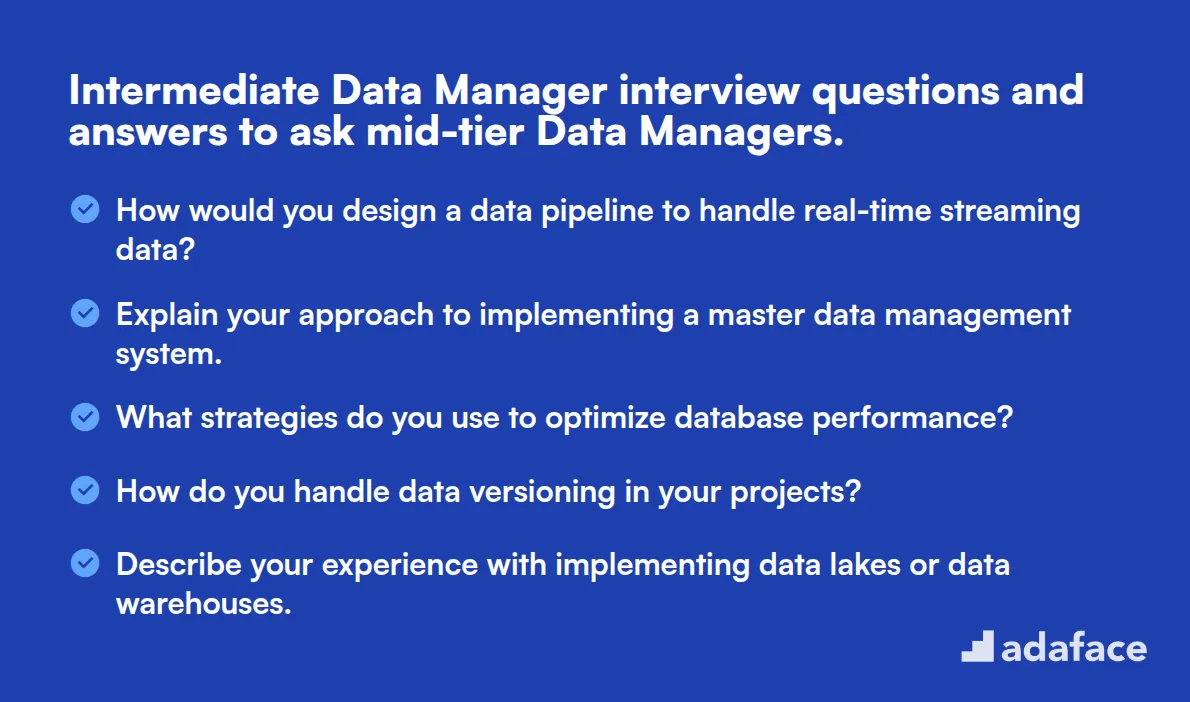
To assess mid-tier Data Managers effectively, use these 12 intermediate interview questions. They're designed to probe deeper into a candidate's experience and problem-solving abilities, helping you identify those with the right mix of technical knowledge and practical skills.
- How would you design a data pipeline to handle real-time streaming data?
- Explain your approach to implementing a master data management system.
- What strategies do you use to optimize database performance?
- How do you handle data versioning in your projects?
- Describe your experience with implementing data lakes or data warehouses.
- What methods do you use for data profiling and why are they important?
- How do you approach data integration from multiple disparate sources?
- Explain your process for creating and maintaining data models.
- How do you ensure data consistency across different systems and platforms?
- What techniques do you use for data anomaly detection?
- How would you implement a data quality scorecard for your organization?
- Describe your experience with metadata management and its importance.
7 Data Manager interview questions and answers related to data governance
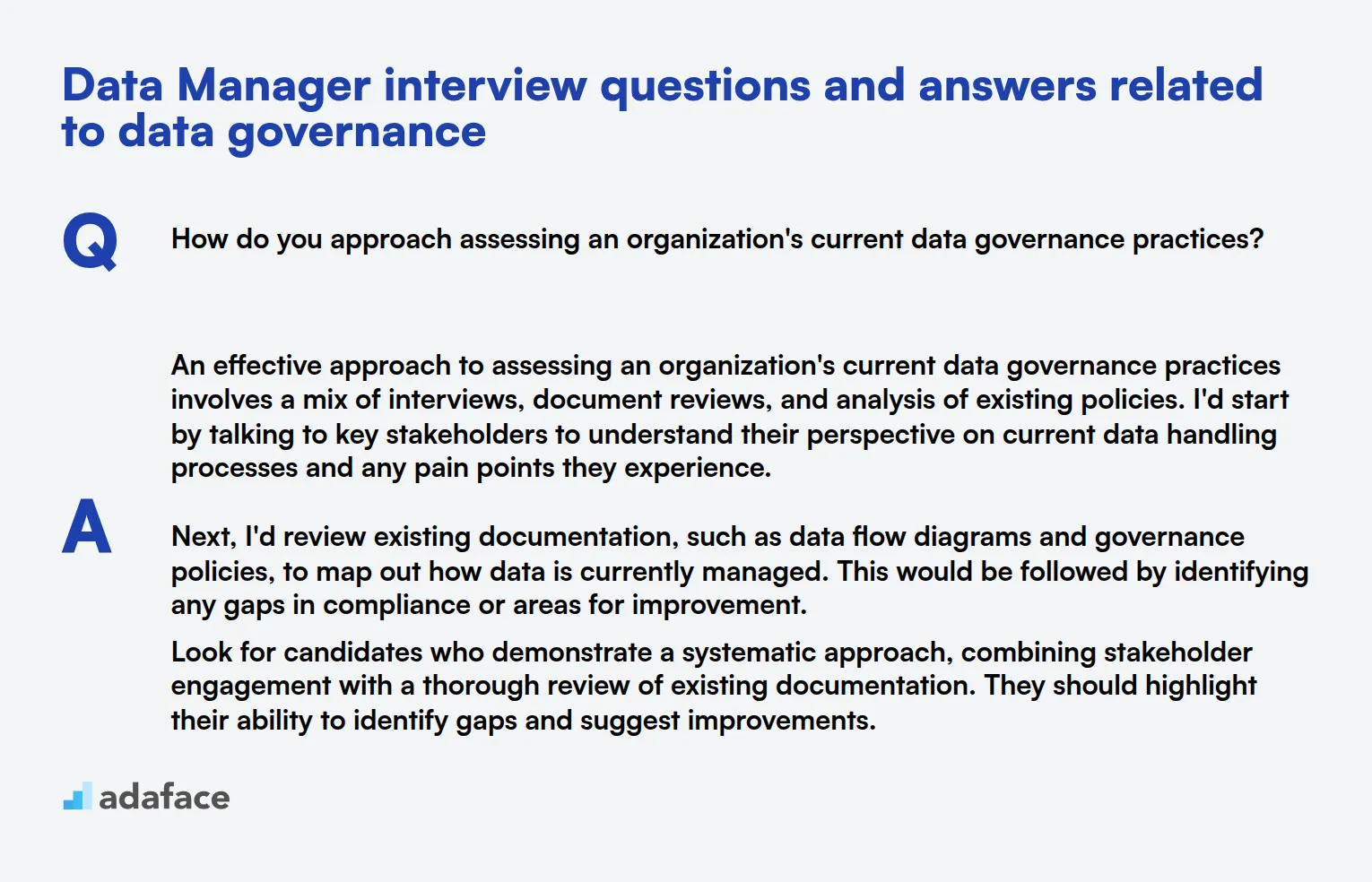
Dive into these data governance-focused questions to ensure you're hiring someone who can deftly navigate the rules, controls, and protocols of data management. Whether you're assessing their ability to uphold data privacy or establish compliance frameworks, this list of questions will help you identify a candidate with the right balance of technical know-how and governance savvy.
1. How do you approach assessing an organization's current data governance practices?
An effective approach to assessing an organization's current data governance practices involves a mix of interviews, document reviews, and analysis of existing policies. I'd start by talking to key stakeholders to understand their perspective on current data handling processes and any pain points they experience.
Next, I'd review existing documentation, such as data flow diagrams and governance policies, to map out how data is currently managed. This would be followed by identifying any gaps in compliance or areas for improvement.
Look for candidates who demonstrate a systematic approach, combining stakeholder engagement with a thorough review of existing documentation. They should highlight their ability to identify gaps and suggest improvements.
2. What steps would you take to develop a data governance framework for a medium-sized organization?
Developing a data governance framework for a medium-sized organization begins with defining data ownership and roles. It's crucial to establish who is responsible for data quality and compliance, from data stewards to data owners.
Next, I would develop policies and guidelines for data usage, access, and security, ensuring they are aligned with both organizational goals and regulatory requirements. Training and regular audits would follow to ensure adherence to these policies.
Ideal candidates should focus on a structured approach to defining roles, creating policies, and implementing training. They should demonstrate awareness of aligning governance with organizational and regulatory standards.
3. How do you ensure compliance with data protection regulations in a rapidly changing environment?
Ensuring compliance in a rapidly changing environment requires a proactive approach. Regularly updating policies and procedures in line with new regulations is key. I would recommend establishing a compliance committee to oversee these updates and ensure everyone is informed and trained on changes.
Additionally, implementing automated tools to monitor data activities can help in identifying any potential compliance breaches early on. Regular audits and reports would also aid in maintaining compliance.
Look for candidates who emphasize proactive policy updates, training, and the use of technology to monitor compliance. They should also show an understanding of the importance of regular audits.
4. Can you describe how you would handle a scenario where data governance policies conflict with business objectives?
In scenarios where data governance policies conflict with business objectives, I would start by analyzing the root cause of the conflict. It's important to sit down with both governance and business teams to understand their perspectives and objectives.
I'd facilitate a dialogue to align governance policies with business goals, potentially revising policies to ensure compliance without stifling business innovation. Compromise and flexibility are key to finding a balanced solution.
Candidates should show strong communication and negotiation skills, emphasizing collaboration between governance and business units to resolve conflicts.
5. What would you consider the most critical component of a data governance strategy and why?
The most critical component of a data governance strategy is data quality management. Without accurate, consistent, and reliable data, any governance effort falls short. This involves setting clear data standards and implementing processes to maintain them.
Monitoring and periodic data quality assessments are essential to ensure ongoing compliance with these standards and to support decision-making processes.
Strong responses will emphasize data quality management as foundational to a successful governance strategy. Candidates should highlight their experience with implementing data quality measures and their impact on organization-wide governance.
6. How would you measure the success of a data governance initiative?
Measuring the success of a data governance initiative involves setting and tracking specific metrics. These could include data quality scores, compliance rates, incident response times, and stakeholder satisfaction levels.
Regularly reviewing these metrics against benchmark data will provide insight into the initiative's effectiveness and areas for improvement. Engaging stakeholders to gather feedback can also be invaluable.
An ideal candidate will demonstrate an understanding of key performance indicators relevant to data governance and how to use them to assess progress and drive continuous improvement.
7. What strategies might you employ to promote data governance awareness across an organization?
Promoting data governance awareness involves a mix of training, communication, and engagement. I would initiate a series of workshops and e-learning sessions to educate employees about governance policies and their role in compliance.
Regular newsletters and updates can keep data governance at the forefront of employee minds, while engaging team leads as champions can help reinforce the importance of governance at all levels.
Candidates should highlight their ability to create an inclusive culture around data governance, using training and regular communication to maintain high levels of awareness and engagement.
9 Data Manager interview questions about data strategy
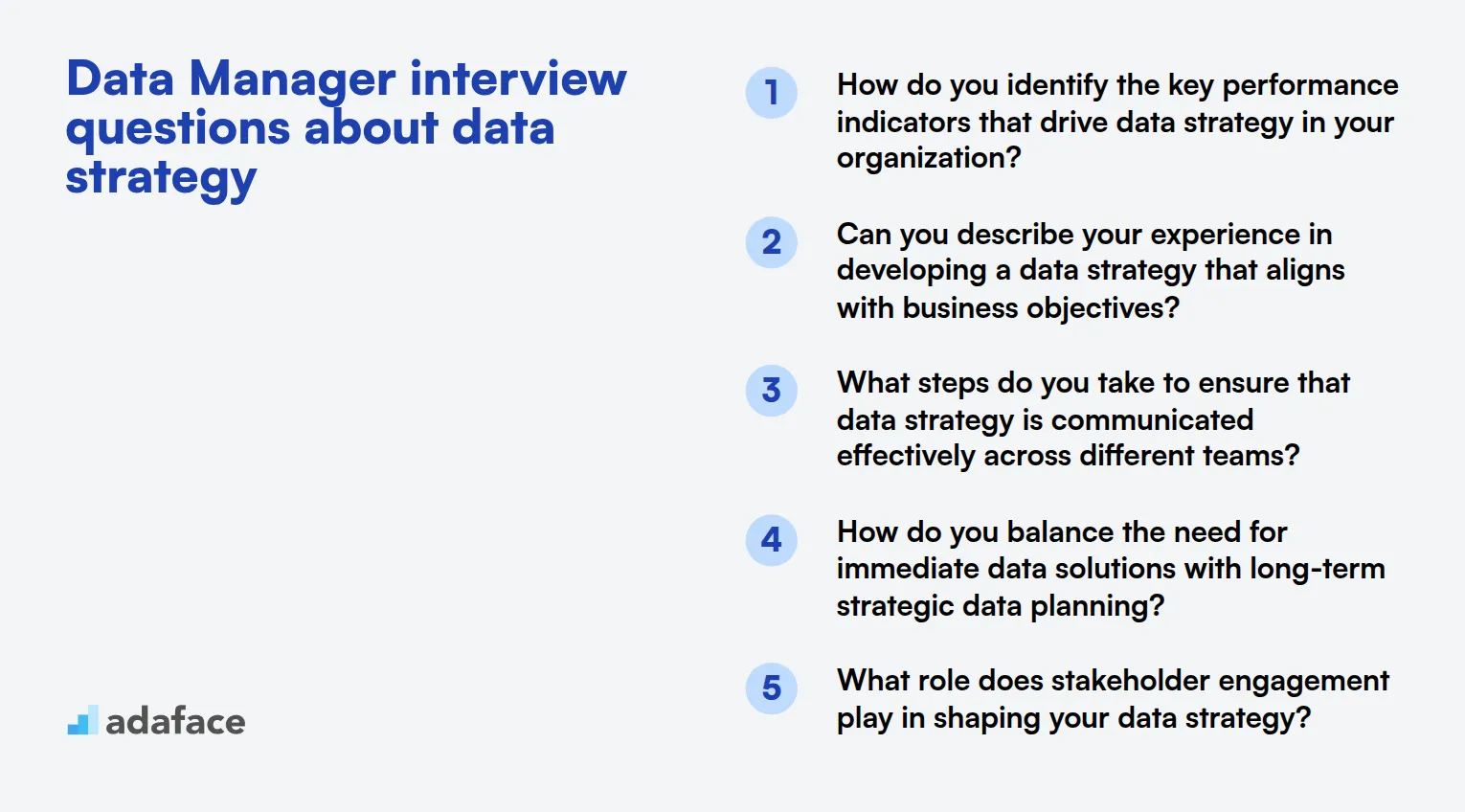
To ensure your candidates can effectively contribute to your organization's data strategy, use these targeted questions during the interview process. They will help you assess the applicant's ability to align data management with business goals, making it easier to find the right fit for your team. For more details on the role, check out this data manager job description.
- How do you identify the key performance indicators that drive data strategy in your organization?
- Can you describe your experience in developing a data strategy that aligns with business objectives?
- What steps do you take to ensure that data strategy is communicated effectively across different teams?
- How do you balance the need for immediate data solutions with long-term strategic data planning?
- What role does stakeholder engagement play in shaping your data strategy?
- How do you evaluate the effectiveness of a data strategy once it has been implemented?
- Can you provide an example of how you adapted a data strategy in response to changing organizational needs?
- How do you incorporate feedback from data users into the ongoing development of your data strategy?
- What tools or methodologies do you use to assess the maturity of your organization's data strategy?
10 situational Data Manager interview questions for hiring top Data Managers
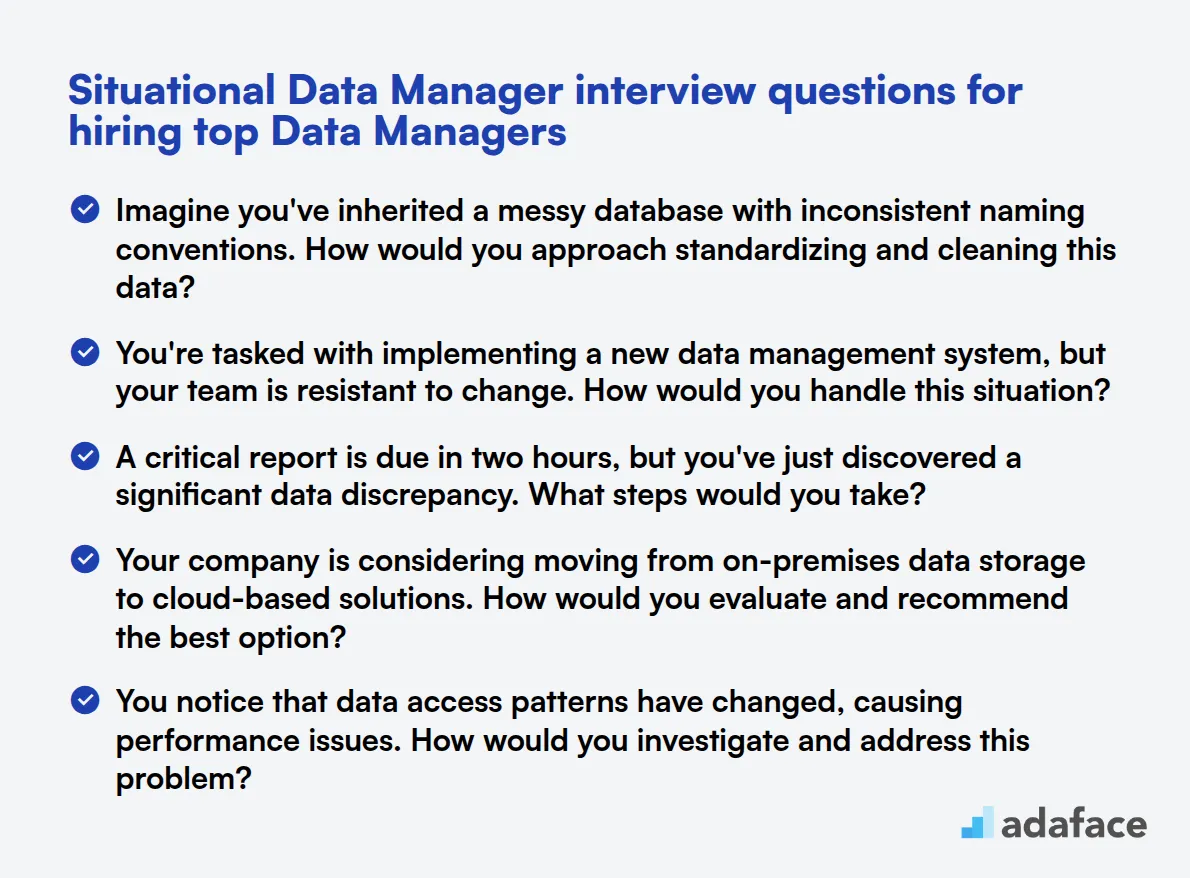
To assess a candidate's ability to handle real-world scenarios as a Data Manager, use these situational interview questions. They help evaluate problem-solving skills, decision-making abilities, and how candidates apply their knowledge in practical situations.
- Imagine you've inherited a messy database with inconsistent naming conventions. How would you approach standardizing and cleaning this data?
- You're tasked with implementing a new data management system, but your team is resistant to change. How would you handle this situation?
- A critical report is due in two hours, but you've just discovered a significant data discrepancy. What steps would you take?
- Your company is considering moving from on-premises data storage to cloud-based solutions. How would you evaluate and recommend the best option?
- You notice that data access patterns have changed, causing performance issues. How would you investigate and address this problem?
- A non-technical manager is pushing for a data-driven decision based on flawed analysis. How would you communicate the issues and suggest a better approach?
- Your team needs to integrate data from a newly acquired company. What potential challenges do you foresee, and how would you address them?
- You're asked to reduce data storage costs without compromising data integrity or accessibility. What strategies would you propose?
- A data breach has occurred in your organization. What immediate steps would you take, and how would you prevent future occurrences?
- You're tasked with improving cross-departmental data sharing. How would you approach this to ensure efficiency and maintain proper access controls?
Which Data Manager skills should you evaluate during the interview phase?
Evaluating a candidate's skills during an interview can be challenging, as one discussion may not reveal the entirety of their capabilities. However, focusing on certain core Data Manager skills can significantly enhance the selection process. These skills are critical for ensuring that the candidate can effectively oversee data management practices and contribute to your organization’s data-driven goals.
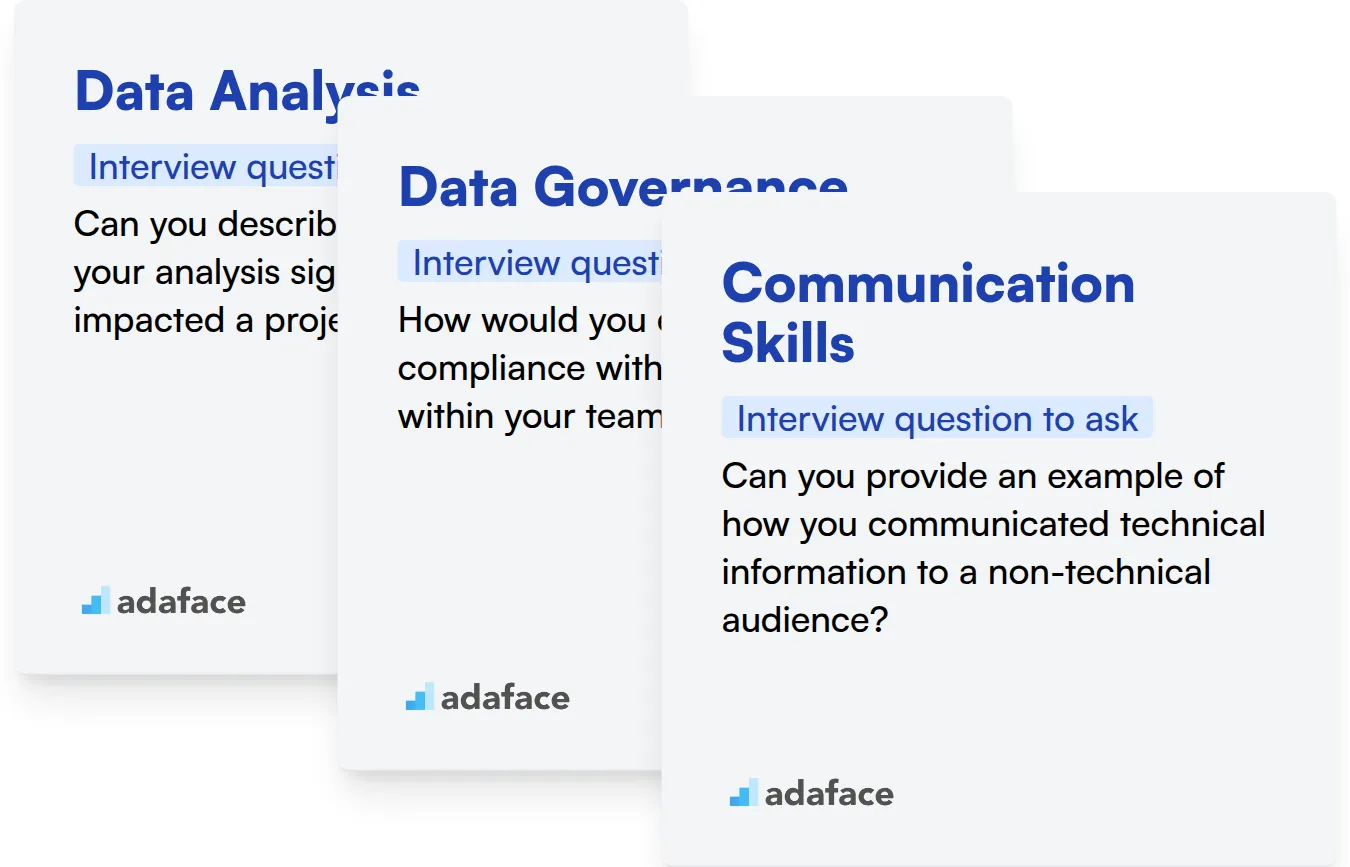
Data Analysis
To evaluate this skill, consider using an assessment test featuring multiple-choice questions focused on data analysis methods and tools. This can help streamline the selection process by filtering candidates based on their analytical proficiency. You might explore our Data Analysis Assessment for a structured approach.
Additionally, you can pose targeted interview questions to assess their data analysis capabilities in practical scenarios.
Can you describe a time when your analysis significantly impacted a project or decision?
When asking this question, look for specific examples of how the candidate used data to influence outcomes. Pay attention to their ability to articulate the situation, the analysis performed, and the results achieved. Strong responses will demonstrate both analytical thinking and the ability to communicate findings effectively.
Data Governance
To assess this skill, consider implementing an assessment test that includes multiple-choice questions on data governance principles and practices. This can be an effective way to gauge candidates' knowledge in this area.
You can further evaluate their understanding by asking direct questions related to data governance.
How would you ensure compliance with data privacy laws within your team?
In their response, look for an understanding of relevant data privacy laws and practical strategies for compliance. Candidates should demonstrate their ability to develop policies and training programs that promote adherence to these regulations while managing data responsibly.
Communication Skills
To evaluate communication skills, consider using an assessment test with situational questions that reflect real-life communication challenges. This approach can help identify candidates who can articulate their thoughts clearly.
You might also want to ask questions that give insight into their communication style.
Can you provide an example of how you communicated technical information to a non-technical audience?
When evaluating their answer, focus on their ability to simplify complex information and engage their audience. Look for examples that illustrate their adaptability in communication and their effectiveness in bridging the gap between technical and non-technical stakeholders.
Find the best Data Manager for your team with Adaface
When hiring for a Data Manager position, it's important to ensure candidates possess the necessary data management skills. Assessing their expertise accurately will help you identify the right fit for your team.
One of the best ways to evaluate these skills is by utilizing skill tests. Consider using our Data Management Test to gauge candidates' abilities effectively.
After administering the test, you can shortlist the best applicants based on their performance and invite them for interviews. This process will streamline your recruitment and help you focus on the most qualified candidates.
To get started, head over to our test library and explore the various assessments available. Sign up today to begin finding the top talent for your Data Manager role.
Data Modeling Skills Test
Download Data Manager interview questions template in multiple formats
Data Manager Interview Questions FAQs
A Data Manager should have strong analytical skills, database management expertise, knowledge of data governance principles, strategic thinking abilities, and excellent communication skills.
Ask questions about data privacy regulations, data quality management, and their experience implementing data governance frameworks in previous roles.
Ask about handling data breaches, resolving conflicts between departments over data access, or implementing new data management tools across an organization.
Focus on their understanding of basic data concepts, eagerness to learn, problem-solving skills, and ability to work in a team environment.
Inquire about their approach to aligning data initiatives with business goals, experience in data-driven decision making, and methods for improving data quality and accessibility.

40 min skill tests.
No trick questions.
Accurate shortlisting.
We make it easy for you to find the best candidates in your pipeline with a 40 min skills test.
Try for freeRelated posts
Free resources




